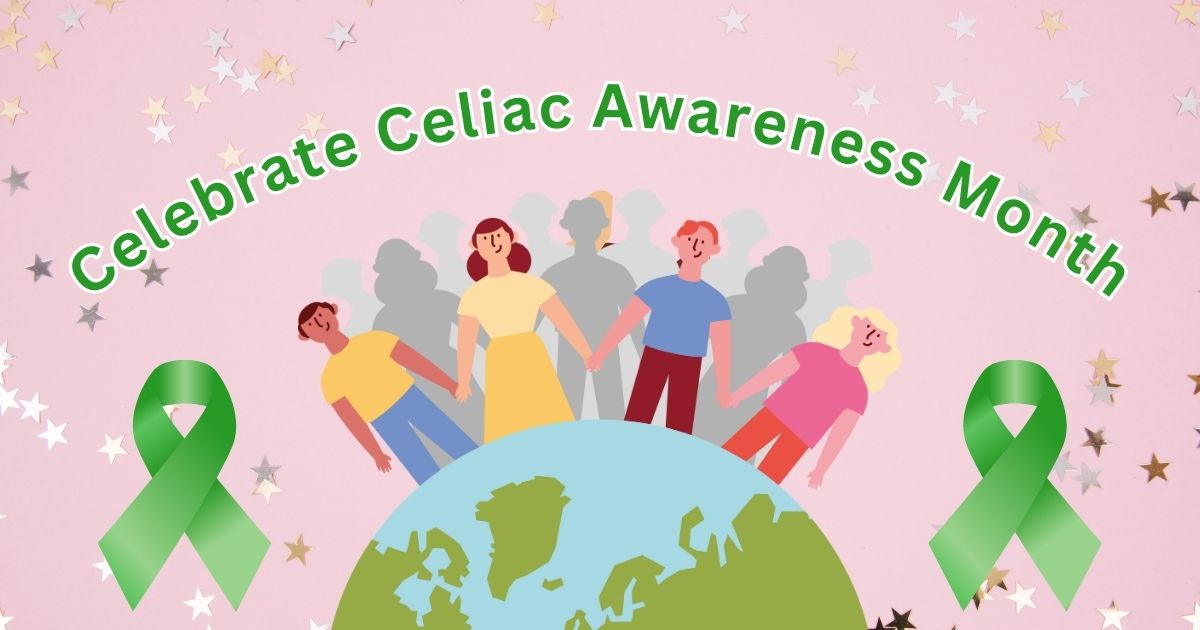Introduction to Celiac Awareness Month
Celiac Awareness Month, observed every May, is a dedicated time to raise awareness about celiac disease, its symptoms, and the challenges faced by those living with the condition. This month serves as an opportunity to educate the public, advocate for early diagnosis, and foster greater understanding of what it means to live gluten-free.
For those newly diagnosed or wanting to learn more, our comprehensive guide, Everything You Need to Know About Celiac Disease, is a great starting point.
Why Celiac Awareness Month is Important
Celiac disease affects approximately 1% of the global population, yet many cases remain undiagnosed. Awareness efforts during this month aim to:
- Promote Early Diagnosis: By educating people on the symptoms and importance of testing, we can reduce the time it takes for individuals to receive a diagnosis.
- Break Stigmas: Misconceptions about gluten-free diets and celiac disease are common. Awareness campaigns help to dispel myths and spread accurate information.
- Encourage Support: Family, friends, and employers can better understand the dietary needs and lifestyle changes required by those with celiac disease.
To better understand the symptoms that often go unnoticed, explore Hidden Symptoms of Celiac Disease.
History of Celiac Awareness Month
The origins of Celiac Awareness Month trace back to advocacy groups that wanted to shine a spotlight on the challenges of living with celiac disease. Key milestones include:
- Establishment in the United States and Canada: May was chosen as the month to align with other health-related campaigns, maximizing visibility.
- Involvement of Nonprofits: Organizations like Beyond Celiac and the Celiac Disease Foundation have played a significant role in launching educational campaigns.
- Growing Global Awareness: Over time, Celiac Awareness Month has gained international recognition, with events now held worldwide.
This focused month has helped amplify the voices of those with celiac disease, fostering a more inclusive and informed community.
Common Misconceptions About Celiac Disease
Despite increased awareness, myths and misconceptions about celiac disease persist. Some of the most common include:
- “Celiac Disease is Just a Food Allergy”: It’s an autoimmune disorder, not an allergy, and it causes long-term intestinal damage when untreated.

- “Gluten-Free Diets Are Just a Trend”: For people with celiac disease, going gluten-free is a medical necessity, not a lifestyle choice.

- “You Can Cheat on a Gluten-Free Diet”: Even small amounts of gluten can trigger symptoms and cause damage, making strict adherence vital.
Understanding the truth behind these misconceptions can help create a supportive environment for those affected. Learn more about living gluten-free with our guide: Living Gluten-Free.
Spotlight on Celiac Disease Symptoms
One of the primary goals of Celiac Awareness Month is to educate the public about the wide range of symptoms associated with the disease. Symptoms can vary significantly from person to person, making diagnosis challenging.
- Digestive Symptoms: These include diarrhea, bloating, abdominal pain, and constipation, often mimicking other gastrointestinal conditions.
- Non-Digestive Symptoms: Fatigue, joint pain, migraines, and skin rashes are common but less recognized signs of celiac disease.
- Silent Celiac Disease: Some individuals experience no noticeable symptoms despite ongoing intestinal damage, making awareness even more critical.
Early recognition of these symptoms can lead to timely testing and diagnosis. To dive deeper into this topic, visit Celiac Disease Symptoms.
Advocacy and Awareness Campaigns
Celiac Awareness Month is marked by numerous advocacy initiatives and events designed to educate and unite communities:
- Local Events and Walks: Many organizations host walks, fundraisers, and awareness campaigns to bring people together.
- Educational Webinars: Experts share valuable insights on celiac disease, its management, and advances in research.
- Social Media Campaigns: Hashtags like #CeliacAwarenessMonth and #GlutenFreeLiving help spread the word online.
These efforts not only raise awareness but also foster a sense of community and support for individuals and families affected by celiac disease.
How to Get Involved in Celiac Awareness Month
There are many ways you can contribute to the success of Celiac Awareness Month and make a difference:
- Educate Yourself and Others: Share reliable resources like Everything You Need to Know About Celiac Disease with your network.
- Host or Attend Events: Participate in local activities or host your own awareness-raising event.
- Support Advocacy Organizations: Donate or volunteer with groups working to improve the lives of those with celiac disease.
- Spread Awareness Online: Use social media platforms to share stories, statistics, and helpful tips.
Your participation can help amplify the voices of those living with celiac disease and encourage greater understanding and support.
Spotlight on Celiac Disease Symptoms
One of the primary goals of Celiac Awareness Month is to educate the public about the wide range of symptoms associated with the disease. Symptoms can vary significantly from person to person, making diagnosis challenging.
- Digestive Symptoms: These include diarrhea, bloating, abdominal pain, and constipation, often mimicking other gastrointestinal conditions.
- Non-Digestive Symptoms: Fatigue, joint pain, migraines, and skin rashes are common but less recognized signs of celiac disease.
- Silent Celiac Disease: Some individuals experience no noticeable symptoms despite ongoing intestinal damage, making awareness even more critical.
Early recognition of these symptoms can lead to timely testing and diagnosis. To dive deeper into this topic, visit Celiac Disease Symptoms.
Advocacy and Awareness Campaigns
Celiac Awareness Month is marked by numerous advocacy initiatives and events designed to educate and unite communities:
- Local Events and Walks: Many organizations host walks, fundraisers, and awareness campaigns to bring people together.
- Educational Webinars: Experts share valuable insights on celiac disease, its management, and advances in research.
- Social Media Campaigns: Hashtags like #CeliacAwarenessMonth and #GlutenFreeLiving help spread the word online.
These efforts not only raise awareness but also foster a sense of community and support for individuals and families affected by celiac disease.
How to Get Involved in Celiac Awareness Month
There are many ways you can contribute to the success of Celiac Awareness Month and make a difference:
- Educate Yourself and Others: Share reliable resources like Everything You Need to Know About Celiac Disease with your network.
- Host or Attend Events: Participate in local activities or host your own awareness-raising event.
- Support Advocacy Organizations: Donate or volunteer with groups working to improve the lives of those with celiac disease.
- Spread Awareness Online: Use social media platforms to share stories, statistics, and helpful tips.
Your participation can help amplify the voices of those living with celiac disease and encourage greater understanding and support.
Summary of Celiac Awareness Month
Celiac Awareness Month, observed every May, is a crucial time dedicated to raising awareness about celiac disease. It highlights the challenges faced by those living with the condition while promoting early diagnosis, education, and support. From learning to recognize symptoms to advocating for better research and resources, this month fosters understanding and connection among individuals, families, and communities.
Key aspects of Celiac Awareness Month include:
- Educating the public on the wide range of celiac disease symptoms, including hidden and non-digestive signs.
- Promoting advocacy campaigns, local events, and social media initiatives to increase visibility.
- Encouraging Personal Stories: Platforms like Beyond Celiac’s “Voices of Celiac” encourage individuals to share their experiences, inspiring and supporting others within the community Beyond Celiac
By participating in Celiac Awareness Month, we can create a more inclusive environment for those with celiac disease and help advance research, education, and resources for a healthier future.
FAQs
- When is Celiac Awareness Month?
Celiac Awareness Month is observed in May in the United States and Canada. - Why is Celiac Awareness Month important?
It raises awareness about celiac disease, promotes early diagnosis, and supports those affected. - How can I participate in Celiac Awareness Month?
You can join events, share educational materials, and support organizations focused on celiac disease. - What are some common misconceptions about celiac disease?
Myths include celiac being a food allergy or that a gluten-free diet is a trendy lifestyle choice. - How does awareness month support celiac disease research?
Increased visibility encourages funding for research and development of gluten-free products.

